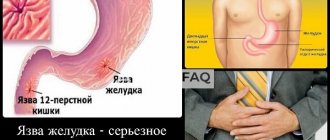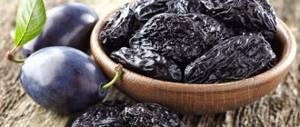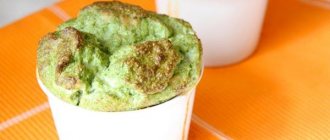Effect on the stomach
Why should you not drink the drink on an empty stomach, what is the best way to consume it and when can you do it? To understand whether coffee is harmful or not for gastritis, you should understand the physiological mechanism of the drink’s effect on the gastric mucosa. Like any hot drink, it has an irritating effect on the gastric mucosa, which responds to this by increasing the secretion of acid and mucus.
In addition to the irritating effects of temperature, coffee has a chemical irritation to the lining of the stomach . Catechol and caffeine, which are contained in the drink, increase the production of hydrochloric acid in the stomach.
Drinking a cup of coffee in the morning provokes the release of acid in the stomach. If this happens during a meal, then hydrochloric acid is used to process incoming food. Otherwise, when the liquid enters an empty stomach, the secreted acid begins to corrode the walls of the organ. Drinking a cup of the drink on an empty stomach can lead to heartburn. Therefore, it is very harmful to drink coffee in the morning on an empty stomach.
With regular consumption of coffee on an empty stomach, you can develop chronic gastritis or stomach ulcers, which can be further aggravated by the formation of a malignant neoplasm.
If the patient has chronic gastritis, pancreatitis, cholecystitis or an inflammatory process in the functioning of internal organs, then drinking the drink can cause an exacerbation of gastritis.
How to drink coffee correctly for people with stomach problems?
And yet, despite all the risks and warnings, in certain cases it is permissible to drink coffee with a sick stomach if you follow a number of simple rules:
- Be careful with the consumption of the drink for hyperacid and hypoacid gastritis, diluting the drink with milk or water.
- Avoid coffee before breakfast and immediately after meals, allowing the body to work correctly.
- Drink the drink only warm.
- Replace instant coffee with natural coffee brewed in a Turkish coffee pot.
- Dose the drink, not allowing yourself more than two cups.
You can allow yourself to cheer up and enjoy the taste and aroma of the drink in exceptional cases by adjusting its strength, temperature, adding milk or heavy cream, and also taking into account the digestion time of coffee - 3-4 hours, which makes it impossible to consume it immediately before bed.
It is not easy to deny yourself coffee completely, even with serious stomach problems. It’s much easier to do this if you have a tasty and, most importantly, safe analogue in mind. Cocoa can claim its place - rich and aromatic.
Diagnoses of gastritis or an ulcer create certain limits in the preparation of a diet. As a rule, chocolate is strictly prohibited in such cases. This means that cocoa can replace not only your favorite coffee, but also chocolate.
The drink has a bright chocolate taste, invigorates and charges you with a good mood. It includes:
- starch;
- polysaccharides;
- organic acids;
- tannins.
Patients with gastritis and stomach ulcers can drink cocoa in the same way as chicory in limited quantities, at the right time with the addition of milk. You need to choose only natural cocoa that needs brewing, and not its instant analogues with a high content of flavors and dyes.
The daily intake of caffeine is 300 mg. This amount does not harm the body, which means you can drink up to two cups. This applies to a natural drink. Instant contains less caffeine - up to 200 mg. Anything that exceeds this norm is harmful. According to researchers, the ideal time for the first cup is 10 am.
If patience does not allow you to wait, for example, because you get up early, there is just time to have something to eat, and you can no longer drink coffee on an empty stomach. Even if you follow the norm, but continue to consume it on an empty stomach, this will not save you from problems with the digestive system. Fortunately, there are a couple of useful tips on how to drink a cup of aromatic coffee, wake up, invigorate, and at the same time not harm your health.
Coffee in the morning is a common “ritual” for starting a new day, lifting your mood and cheerfulness. In the morning and throughout the day, the body will remain in good condition if you follow the tips and simple rules for drinking the aromatic drink.
Even if you are on a diet, you should have breakfast before drinking a cup of green coffee. After a snack, you can safely enjoy a drink without forgetting about your daily caffeine intake. As a result, it will not cause any harm to the body.
• Magnesium – participates in maintaining the normal function of the nervous system and heart muscles, promotes intestinal motor activity;
• Calcium is necessary for strong bones and for the body cells to obtain essential nutrients;
• Zinc – fuel of the immune system;
• Iron is needed to create new red blood cells.
Drinking coffee is contraindicated if a person has gallstones. The drink itself does not cause them, but its excessive consumption increases the content of calcium, magnesium, citrates and other substances in the urine that are part of the stones that form. When it comes to coffee, the best way is to use moderation. If it has a serious impact on your well-being, it is best to reduce its use for a time or to a minimum.
If a person has excellent health, then the drink will not harm him in any way. When drinking two or three cups of drink, your health will be strong, your intestines will work like clockwork. The main thing: do not drink it in large quantities, drink strong coffee only after meals (not immediately, but after 30-50 minutes). This way, the process of normal processing of food by enzymes in the stomach will not be disrupted.
Both natural and instant drinks can cause harm to the body. The second, in addition to caffeine, contains chemical impurities to enhance taste and aroma, which are harmful to human health. Natural coffee beans also contain caffeine and chlorogenic acids. These elements can attack the liver, stomach, pancreas and irritate the intestines. Therefore, doctors do not recommend drinking strong espresso on an empty stomach in the morning immediately after sleep.
During the night, the stomach digests leftover food. In the morning he is ready to receive a new portion of healthy food, but not in the form of a drink with an irritating effect on the mucous membrane. Espresso has a sour taste, which is why coffee on an empty stomach hurts your stomach. Hydrochloric acid is released immediately after drinking. Since she will have nothing to eat, heartburn will appear. This threatens the development of diseases such as gastritis, ulcers and even stomach cancer.
The ancient tradition of serving coffee after meals has long roots. When receiving guests, nobles set the table in a separate room, not the one where the dinner took place. The guests went there later after the meal, had a coffee ceremony, and had leisurely conversations. Already at that time they knew that it was necessary to follow certain rules when drinking a drink made from coffee beans.
The drink is contraindicated for patients suffering from hyperacid gastritis and inflammation in the acute phase, regardless of its form. This is primarily due to the stimulating effect of coffee on the secretion of hydrochloric acid. In addition, chlorogenic acids in the product themselves reduce the pH of gastric contents.
Erosive gastritis is also not the best diagnosis for coffee lovers. Pampering yourself with your favorite drink is allowed only after the erosions have healed, provided that the acidity of the gastric juice is normal.
Hypoacid and erosive gastritis are those forms of the disease that allow the use of the product, but you must follow the rules that make coffee safer for digestion.
We have already mentioned that it is better for patients with gastritis to forget about instant coffee. This is primarily due to the high content of artificial chemical components and stabilizers that irritate the walls of the stomach. And even the “milk” additive in freeze-dried coffee does not save the quality characteristics, since this ingredient has little in common with milk.
Cappuccino and latte coffee drinks are optimal because they contain a high concentration of milk. Raf is also allowed, provided that the cream in it is low-fat.
You should not drink espresso and ristretto if you have gastritis because of their strength. Such drinks greatly irritate the stomach and provoke the development of inflammation.
Many believe that decaffeinated coffee does not have a negative effect on the gastric mucosa and you can drink it without restrictions if you have gastritis. Unfortunately, this version is not true, since it is not caffeine that contributes to the acidification of gastric contents, but chlorogenic acids and other biologically active substances.
If acidity levels are low, it is possible to use a less strong option after meals - Americano. It is possible to prepare coffee in a French press: it turns out less concentrated and thick, and therefore more gentle on the gastrointestinal tract.
When to drink or not to drink coffee
Can this tonic drink be used for gastritis, and in what form? If a patient drinks coffee in the morning, the following happens: to process this product, the body secretes a lot of gastric juice to cope with it. Although the volume of the drink entering the body is small, it requires a large volume of hydrochloric acid to digest it, which ultimately causes heartburn.
The most dangerous time for drinking a tonic drink is the period when one stage of food absorption has ended, and a new one has not yet begun.
If you drink coffee, then only when the acid in the stomach has begun to be released, and the digestion process is in full swing. But it should not be very strong and hot. If you follow this rule, you are allowed to drink an invigorating drink.
If the patient’s medical history includes diseases of the digestive system, then consuming hot drinks is extremely undesirable. They can only cause irritation of the mucous membrane of the digestive organ.
When you want to drink coffee, it is important to consider several points:
- a strongly brewed product can irritate the gastric walls even in a completely healthy person;
- if an inflammatory process occurs in the gastric mucosa, then drinking coffee is not recommended, or is allowed, but in small doses;
- in case of chronic, erosive, atrophic gastritis, it is also undesirable to drink it, since the presence of chlorogenic acids in the drink provokes a small “explosion” of acidity, which leads to severe pain, heartburn and belching;
- due to provoking acid synthesis, coffee is contraindicated in gastritis with increased secretion;
- It is advisable to drink an invigorating drink an hour after eating;
- Patients with gastrointestinal diseases are not recommended to drink coffee prepared in a French press or cezve. It is better if it is a drink prepared in a coffee maker with disposable filters;
- If a patient is diagnosed with gastritis with low acidity, it is recommended to drink no more than 2 cups of a weak drink diluted with milk.
Gastritis concept
Gastritis is a pathology of the stomach in which inflammation of the mucous membrane is detected. The disease has 2 types: acute and chronic. The acute form is most often caused by one-time exposure to chemicals that irritate the mucous membrane, as well as poor nutrition.
The chronic form of the disease develops due to the transition of acute gastritis to chronic, as well as with regular consumption of alcoholic beverages, abuse of fried, fatty foods, and regular use of medications (non-steroidal anti-inflammatory drugs, antibiotics and others).
Gastritis crept up unnoticed
Constant stress is considered a significant cause of the disease. In stressful situations, the stomach secretes more gastric juice, which provokes erosion of the organ mucosa. Regular hunger and long breaks between meals can lead to pathology. Symptoms of the disease are:
- Dyspeptic manifestations.
- Pain in the hypochondrium, around the navel, right hypochondrium.
- The pain syndrome appears after eating, on an empty stomach or at night.
- Bitter taste in the mouth.
- Deterioration of memory and attention.
If these symptoms are observed, you should not drink coffee if you have gastritis, as consuming the product will provoke an increase in symptoms.
Types of coffee and gastritis
Soluble
Instant coffee has a bad effect on the stomach during acute or chronic inflammation of the organ. This is due to an increase in the level of biological substances in the resulting concentrate. With gastritis with high acidity, drinking instant coffee results in pain, heartburn, nausea and bloating, and intestinal upset.
For gastritis with low acidity, the soluble product should not be consumed. It contains many harmful additives, tannins, which can cause nausea and heartburn.
Ground
In a natural product, the percentage of tannins is lower; this drink is not so dangerous for the health of the digestive tract. But even it should not be consumed uncontrollably.
With milk
If giving up a cup of coffee seems impossible, drinking it with milk may be an ideal option. Thanks to coffee with milk, stomach acidity is normalized. Added milk reduces the temperature of the drink, making it comfortable and healthy to drink. For this, coffee should only be natural, and milk should be added with a low fat content.
What can replace coffee?
What should a coffee lover do if drinking your favorite drink during an exacerbation of the disease is temporarily prohibited by the attending physician? In this case, they are looking for a replacement for the natural coffee composition based on their own gastronomic preferences:
- A great alternative would be the popular coffee drink with barley or chicory. It also has an invigorating effect and preserves the coffee aroma;
- Cocoa is a good way to awaken cocoa, the taste of which is reminiscent of coffee with added milk;
- drink mate - this is a tea composition that has an invigorating effect.
However, giving up coffee is not easy. You can alleviate suffering by adding cocoa cookies or coffee candies to the coffee substitute. Only all this should be agreed with your doctor, since nutrition for gastritis requires mandatory compliance with all recommendations.
Although, when diagnosing gastritis, you should not immediately despair. Is it possible to drink coffee if you have gastritis, your doctor will tell you. This depends on many factors, including the degree of neglect of the disease. Based on the results of diagnostic studies, the gastroenterologist will select a diet suitable for the human body, which must be followed until the end of the therapeutic procedures. The doctor will also give recommendations regarding certain dietary restrictions to avoid relapses in the future.
We recommend: What is erythematous gastritis and the main methods of its treatment
Coffee for different types of gastritis
For gastritis with low acidity
For gastritis with reduced gastric secretion, drinking coffee is even beneficial, but be sure to follow the rules of intake - no earlier than 1 hour after eating food, and it should not be hot and strong. Also, in this case, it is not necessary to dilute the drink with milk, but it is preferable to drink a natural product rather than an instant one. You should limit yourself to 3 cups of drink per day.
With increased acidity
If there is increased secretion of gastric juice, you should completely stop drinking coffee, because after drinking it, acidity may increase, and pain and irritation of the organ mucosa will appear.
Drinking it with high acidity is allowed if the disease is in remission. It is also advisable to drink a natural drink and not hot.
Coffee in case of exacerbation of the disease
Is it allowed to drink coffee during an exacerbation of gastritis? This drink has an irritating effect on the inflamed mucous membrane, so during this period it is better to replace the drink with still mineral water, liquid jelly (brewed from natural berries), and herbal teas (made from herbs that have an enveloping effect).
Recommendations from gastroenterologists
To minimize the irritating effects of the drink, listen to these tips that will allow you to enjoy it safely.
- Preference should be given to natural coffee rather than instant coffee. Ideally, it should be ground immediately before use.
- You should not drink coffee on an empty stomach, it will quickly increase acidity, and symptoms of exacerbation will appear. It is best to eat it as a dessert, half an hour after a meal.
- The drink should not be too hot so as not to damage the mucous membrane.
- The safest way to prepare it is coffee with milk. It neutralizes caffeine acids and also makes the drink less hot. Just remember that in case of stomach inflammation, preference should be given to skim milk.
- You are allowed to drink no more than two cups of coffee per day.
- For normoacid or erosive gastritis, try dark roasted beans; for hypoacid gastritis, try lighter roasted beans.
- The drink should not be overly sweet, and you should not add hot spices to it.
- Don't drink coffee grounds. It must be filtered or left at the bottom of the cup.
These simple rules make the drink accessible even with gastritis.
- Ginger for stomach or duodenal ulcers, is it possible to use ginger root
- Is it possible to drink coffee if you have gastritis?
- How to treat your stomach at home
- Persimmon for gastritis - what are the benefits and harms and when can you eat it?
Coffee substitutes for gastritis
Every patient who loves coffee can choose an option according to their personal preferences.
Barley drink
This barley drink is known for its general strengthening effect, which is useful for people who are frequently exposed to physical activity and all kinds of stress.
Barley and products made from it are indispensable components of therapeutic nutrition for certain gastrointestinal diseases. They are useful for dysbiosis, biliary dyskinesia, pancreatitis. Biological substances that are found in barley grains have a positive effect on the intestines - they cleanse it and help restore the mucous membrane of the digestive canal.
Complex high-molecular carbohydrates that are present in barley contribute to the development of normal intestinal microflora and improve immunity. The biocomponents of barley grain have an antimicrobial effect and relieve inflammation. Replacing it with a barley drink will have a beneficial effect on the gastric mucosa and on the functioning of the whole body.
A barley drink that replaces regular coffee for gastritis can be prepared in this way. Take pre-dried barley grains and fry them in a dry frying pan without oil. Then grind it in a coffee grinder. The resulting powder is used to prepare a drink. 10 g of barley powder is poured into the Turk and 200 ml of cold water is poured. Boil for 2 minutes and leave covered for 5 minutes. As an option, mix chicory powder and barley grain powder (half a teaspoon of chicory per glass of water). You can add milk to taste.
Chicory drink
Chicory rids the body of toxins and other harmful substances. It contains inulin, which is considered a natural sugar substitute, which is why this drink can be consumed by those who suffer from diabetes. Chicory has pronounced antiseptic or anti-inflammatory properties.
Coffee lovers will love that, in addition to being healthy, chicory tastes like regular coffee. To prepare it, pour 5 g of chicory powder into a glass of boiling water. You can add a little milk and sugar.
Cocoa
For gastritis, cocoa can replace coffee. It helps relieve fatigue and energizes you. Cocoa contains many useful substances: organic acids, polysaccharides, starch, tannins.
Mint tea
Mint tea can be a good substitute for coffee. This herb reduces inflammation of the stomach lining. To prepare the drink, take 5 g of dry mint and brew 200 ml of boiling water, then leave for about 20 minutes, filter and drink 100 ml twice a day before meals. In the evening, you can add a little honey to mint tea.
List of references: https://www.kp.ru/guide/chto-mozhno-est-i-pit-pri-gastrite.html https://coffeefan.info/mozhno-pit-kofe-pri-gastrite-zheludka. html https://morecoffee.ru/kofe-pri-gastrite.html https://kofella.net/kofe-i-zdorove/kofe-pri-gastrite.html https://zds.com.ua/news-mozhno -pit-coffee-gastrit-jazvy-zheludka Notes from the author of the article, based on personal experience. This material is purely subjective and is not a guide to action. Only a qualified specialist can determine an accurate diagnosis and prescribe treatment.
Article last modified: 03/12/2020
Instant or natural coffee?
Our store shelves are replete with an abundance and variety of instant coffee. Of course, because it’s faster to brew, easier to store, and even tasty. BUT! We think little about its composition. The fact is that during the processing a huge amount of carcinogens was released. This coffee is concentrated, which means it is not natural. And if it’s not natural, it means it’s harmful. When such coffee gets ingested, even the stomach of a healthy person begins to react with pain, pain, and nausea.
Natural coffee brewed in a coffee machine has both an aroma and a different taste. This coffee has a lower content of tannins, and the amount of carcinogens there is noticeably lower than in instant coffee. This coffee should be drunk fresh, but not hot. The natural product contains sodium, phosphorus, iron.
Natural coffee is good for our body, but as we know, everything should be in moderation. This is especially true for people suffering from gastritis.
If your gastritis is caused by a bacterium such as Helicobacter Pilori, then coffee is allowed in minimal doses (1 - 2 cups per day). If not, then it’s better to think 100 times, is it worth it? It may be better to replace coffee with other products.









